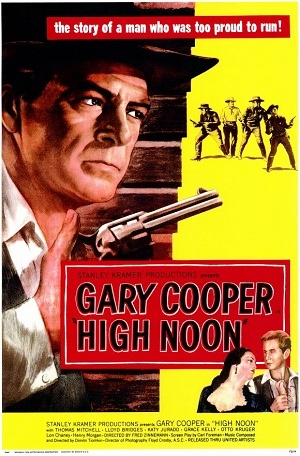The 1948 film noir, Force of Evil, plays out like a fever dream of dark and disturbing things.
The film begins on the third of July with attorney Joe Morse (John Garfield) telling us that, by the end of the 4th of July, he will have made his first million dollars, something that he describes as being “an important moment in every man’s life.” Joe has an appreciation of money that one can only get from growing up poor. By his own admission, Joe spent most of his youth on the streets, committing petty crimes. It was his older brother, Leo (Thomas Gomez), who held things together back home and who kept Joe from getting into any truly serious trouble. Now, years later, Joe is an attorney and Leo is a small-time player in New York’s numbers racket.
(The numbers racket, as the film explains, is an illegal lottery in which people — mostly in working class neighborhoods — bet on which three numbers will be drawn at the end of the day. In this film, those three numbers are the last three digits of “the handle”, the amount race track bettors placed on race day at a major racetrack, published in the major newspapers in New York.)
Joe now works for Ben Tucker (Roy Roberts). Tucker may look like a respectable businessman and he may operate out of an office building but he’s actually a gangster. He got his start as a bootlegger and then, after prohibition ended, he moved into the number game. He and Joe have come up with a scheme to consolidate and take over the entire New York numbers racket. They’re going to fix the handle so that, on July 4th, everyone who picks “776” as their three numbers will win. (As Joe explains, a mix of patriotism and superstition leads to thousands of people picking 776 on every Independence Day.) When the small time operators don’t have the money to pay off the winners, Tucker will loan them the money to stay afloat. However, by accepting the loan, the operators will now be in debt to Tucker and Tucker will basically control their operations. Anyone who doesn’t want to work for Tucker will either be out of work or dead. It’s all strictly business.
The only problem is that Joe knows that the plan will basically bankrupt Leo. When Joe goes to Leo and tries to warn him, Leo refuses to listen to him. Leo may be a criminal but he’s an honest criminal and he has no interest in getting involved with someone like Ben Tucker. Leo watches out for the people working underneath him and treat them fairly, a concept that men like Ben Tucker will never understand. In fact, the only thing that Leo asks from Joe is that Joe make sure that Leo’s longtime secretary, Doris Lowry (Beatrice Pearson), is taken care of.
Needless to say, things get even more complicated from there….
Force of Evil presents us with a world where everyone — with exception of maybe Doris — is corrupt and where everything — from blackmail to murder — is strictly business. Greed is the motivator for every action and the more money that comes in, the easier it is to justify every ruthless act. Joe makes his fortune over the course of one of America’s most sacred holidays but it comes at the expense of his brother. His brother tries to do the right thing as far as his employee are concerned, just to discover that the Walter Tuckers of the world don’t care what happens to the people who work for them as long as the money keeps coming in. It’s a dark and cynical movie, a gangster movie were the cops are just as dangerous as the people they’re arresting and where concepts like love and loyalty mean nothing when there’s money to be made.
As directed by Abraham Polonsky, Force of Evil plays out like a filmed nightmare. Every interior seems to be full of ominous shadows and the exterior scenes always seem to find characters like Leo Morse and his timid accountant (Howland Chamberlain) dwarfed by the city around them. Gangsters like Ben Tucker and his associates emerge from the darkness, with the film’s final shoot-out taking place in complete darkness and featuring characters shooting at shadows despite not knowing who that shadow might belong to. It’s a dark and claustrophobic world that Polonsky presents, one that always seems to be closing in on the Morse brothers and the people unlucky enough to be around them. (The real world would later close in on Polonsky, an unapologetic Marxist whose ideology is obvious in the film’s portrait of crime just being another form of big business. Polonsky was among those blacklisted in the 50s. Force of Evil was the first of only three movies that he would ever direct.)
John Garfield plays Joe Morse with a barely contained anger. Even after he’s made his first million, he’s still angry at the world. Getting rich is his revenge on a society that predicted that someone like him would never amount to anything. Roy Roberts is perfectly sleazy as the outwardly respectable Walter Tucker and Marie Windsor has a few wonderful scenes as his vampish wife. Perhaps the film’s best performance comes from Howland Chamberlain, playing an accountant who soon finds himself in over his head as Tucker makes his move on Leo’s operation.
Tough, violent, and visually unforgettable, Force of Evil is an excellent gangster film and a classic noir. It’s definitely an offer that you can’t refuse.
Previous Offers You Can’t (or Can) Refuse:
- The Public Enemy
- Scarface
- The Purple Gang
- The Gang That Could’t Shoot Straight
- The Happening
- King of the Roaring Twenties: The Story of Arnold Rothstein
- The Roaring Twenties











